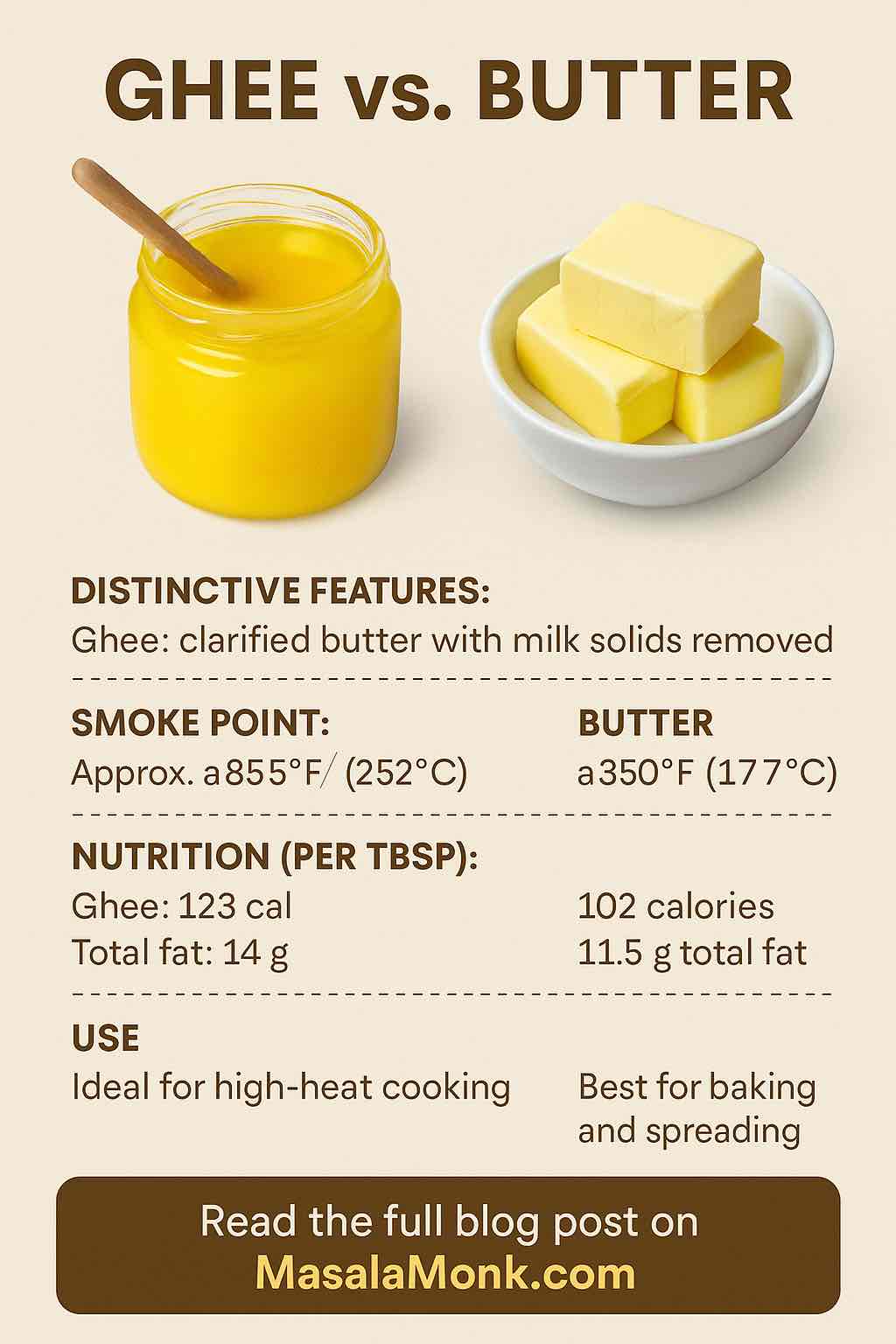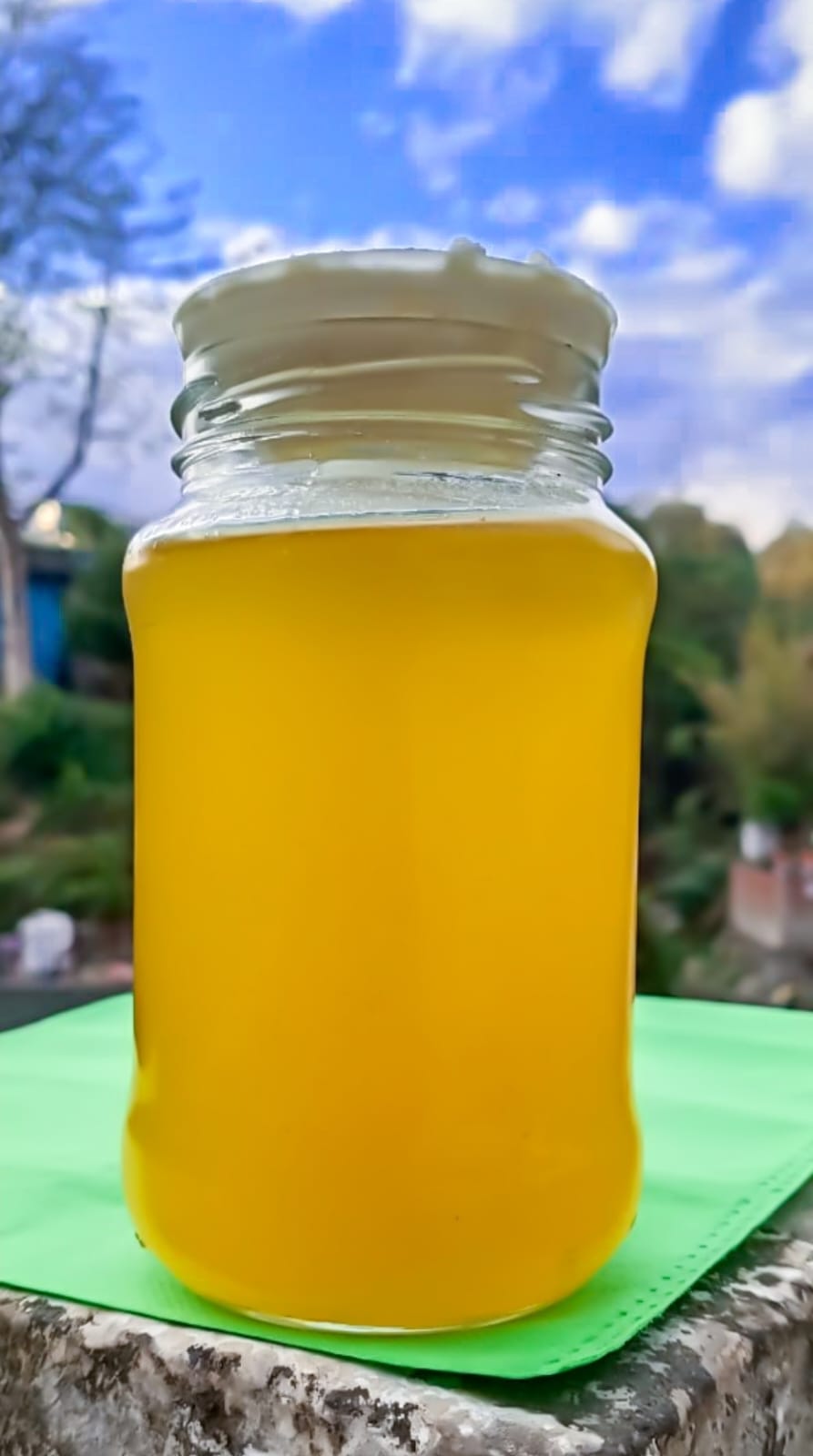
When you open your fridge or pantry, there’s a good chance you’ll spot a golden slab of butter or, if you love world cuisine, a jar of ghee glowing like liquid sunshine. Both are beloved fats, both are rooted in centuries of tradition, and both spark debate among health enthusiasts and home cooks. But when it comes to choosing between ghee and butter, which one actually deserves a spot in your kitchen?
Let’s peel back the layers—scientifically, nutritionally, and practically—so you can decide what’s best for your table.
What Are Ghee and Butter, Really?
Butter is a staple of European and American kitchens, made by churning cream until the fat separates from the buttermilk. The result: a spreadable, creamy block that makes croissants flaky, cookies rich, and vegetables irresistible.
Ghee, meanwhile, is the pride of South Asian cuisine. It starts as butter, but is simmered until the water evaporates and milk solids brown and are filtered out. The end product is a clear, fragrant fat with a nutty aroma—a pantry hero in Indian, Pakistani, Bangladeshi, and Middle Eastern kitchens.
How Are They Made? (And Why Does It Matter?)
- Butter’s Journey:
- Cream is separated from milk.
- Cream is churned, causing fat globules to clump.
- The solid butter is washed, shaped, and (sometimes) salted.
- Contains about 80% fat, 16% water, and milk proteins/sugars.
- Ghee’s Transformation:
- Unsalted butter is slowly simmered.
- Water evaporates; milk solids caramelize and sink.
- The clear, golden fat is poured off and strained.
- Nearly pure fat, almost no lactose or casein.
Why care? Because the absence of milk solids in ghee changes its shelf life, its behavior in the pan, and even how it might affect your body.
The Science: Nutrition at a Glance
Here’s a quick table (per tablespoon):
| Butter | Ghee | |
|---|---|---|
| Calories | ~102 | ~123 |
| Total Fat | ~11.5g | ~14g |
| Saturated Fat | ~7.2g | ~8.7g |
| Lactose/Casein | Present | Almost none |
| Vitamins (A, E, K) | Present | Slightly higher concentration (due to fat density) |
| Smoke Point | ~350°F (177°C) | ~485°F (250°C) |
| Shelf Life | Refrigerate | Room temp (months) |
TL;DR: Ghee is richer, purer, and more stable at high temperatures, but also packs more calories and fat. Butter contains trace dairy sugars and proteins, which matter for some people.
Health: What Does the Research Say (as of 2025)?
The Latest Evidence
- Heart Health:
A recent meta-analysis (2024) found no compelling link between ghee consumption and increased cholesterol or heart disease in the general population. However, ghee (like butter) is still high in saturated fat, which is generally advised in moderation by major health agencies. - Gut Health & Nutrients:
Ghee is a source of butyrate—a short-chain fatty acid linked to gut health and anti-inflammatory benefits. It’s also a good source of vitamins A, E, and K, as well as conjugated linoleic acid (CLA), which may have subtle metabolic benefits. - Allergies & Sensitivities:
Butter contains trace amounts of lactose and casein—potential triggers for people with intolerance. Ghee’s clarification process removes nearly all of these, making it a safer bet for many with sensitivities (though not all with severe dairy allergies). - Cooking Safety:
Ghee’s high smoke point means it won’t burn or develop harmful compounds as quickly as butter does when exposed to high heat.
Cooking Showdown: Butter vs. Ghee in the Real World
When to Use Butter
- Baking:
Butter’s water and milk solids create steam (for flakiness in pastries) and delicious browning in cookies and cakes. - Spreading:
Perfect for slathering on toast, pancakes, and warm rolls. - Sauces:
Butter’s emulsifying properties make for creamy hollandaise and velvety beurre blanc.
When to Use Ghee
- High-Heat Sautéing & Frying:
Ghee won’t burn until 485°F—so it’s excellent for searing, frying, roasting, and sautéing. - Flavor-Boosting:
Adds a deep, nutty aroma to rice, dals, curries, roasted veggies, and even popcorn. - Dairy Sensitivities:
Ghee is almost universally tolerated by those who can’t handle regular dairy fats.
Real-Life Tips: Making the Most of Each
- Storage:
- Butter: Keep refrigerated (especially unsalted), use within a month for best flavor.
- Ghee: Store in a cool, dry place with a tight lid; lasts for months without refrigeration if moisture is kept out.
- Homemade Ghee:
You can make ghee at home in under 30 minutes. Simmer unsalted butter, skim off foam, filter out solids, and pour the liquid gold into a clean jar. - Blending Fats:
Don’t be afraid to use both in your kitchen—each shines in different scenarios!
Practical Buying Advice
- Quality Matters:
Look for grass-fed sources (for higher nutrients and CLA), minimal processing, and no additives. - Read the Labels:
Especially if you have allergies—some commercial ghees aren’t fully clarified and may contain traces of milk proteins.
Final Verdict: Which Should You Choose?
It’s not either/or—it’s about what you need.
- Use butter for classic Western baking and when you want that creamy, milky flavor.
- Reach for ghee for high-heat cooking, South Asian and Middle Eastern recipes, or if you need a lactose/casein-free option.
Both are delicious. Both are rich. Both should be used thoughtfully—especially if you’re watching your saturated fat intake.
Final Thoughts
Butter and ghee both have rich histories, loyal fans, and unique roles in the kitchen. By understanding their differences, you can use each to its best advantage—and enjoy your food all the more.
Have your own butter or ghee cooking hack? Share in the comments below!
10 Essential FAQs: Ghee vs. Butter
1. What is the main difference between ghee and butter?
Ghee is clarified butter—made by simmering butter to remove water and milk solids, resulting in a pure fat that’s lactose- and casein-free. Butter is churned cream, containing water and milk proteins.
2. Is ghee better for people with lactose intolerance?
Yes, most people with lactose intolerance tolerate ghee well because the lactose and casein are removed during clarification. However, those with a true milk allergy should still exercise caution.
3. Which is healthier: ghee or butter?
Both are calorie-dense and high in saturated fat. Ghee is slightly higher in vitamins A, E, and butyrate, but neither is considered “healthier” for everyone. Moderation is key.
4. Can you substitute ghee for butter in baking?
You can, but expect a change in texture and flavor. Ghee’s lack of water/milk solids makes baked goods denser and gives them a nuttier, richer taste.
5. Does ghee need to be refrigerated?
No, ghee is shelf-stable at room temperature for several months if kept in a cool, dry place with a tight lid. Butter, on the other hand, requires refrigeration.
6. What is the smoke point of ghee versus butter?
Ghee’s smoke point is around 485°F (250°C), making it ideal for high-heat cooking. Butter’s smoke point is lower, about 350°F (177°C), so it burns more easily.
7. Is ghee good for heart health?
Recent studies show ghee doesn’t significantly worsen cholesterol for most people, but due to high saturated fat, both ghee and butter should be consumed in moderation—especially for those with heart disease risk.
8. Can you make ghee at home?
Yes! Simply simmer unsalted butter until milk solids separate and brown, then strain out the solids for pure ghee.
9. Which tastes better—ghee or butter?
Taste is subjective: butter is creamy and slightly sweet; ghee is nutty and aromatic. Ghee adds a deep, rich flavor to many dishes, especially curries and roasted foods.
10. Are there any culinary uses where ghee is clearly superior to butter?
Yes, ghee excels in high-heat cooking (like sautéing, frying, roasting) and dishes needing a nutty, rich aroma. It’s a staple in South Asian, Middle Eastern, and some Paleo/Keto recipes.











